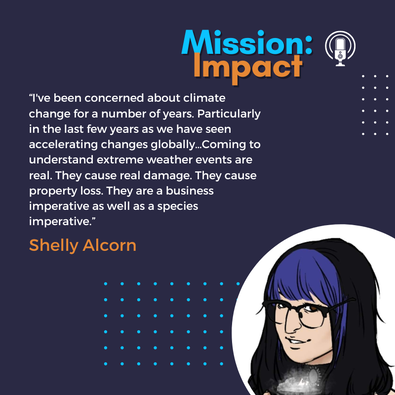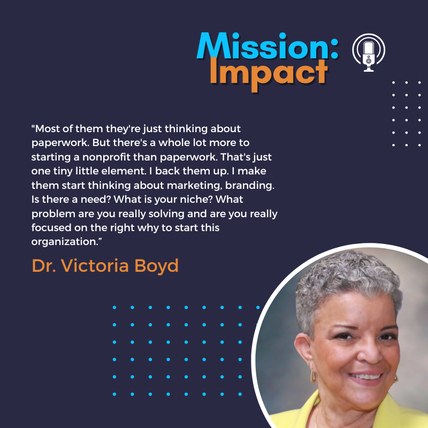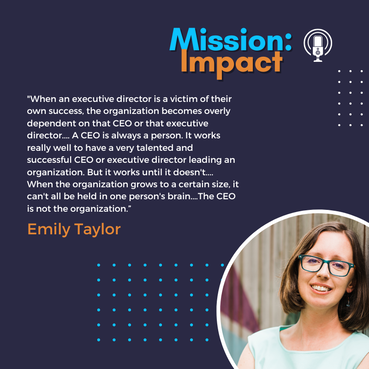Mission: Impact podcast & blog
Build a better world without becoming a martyr to your nonprofit cause
Listen on:
 In episode 99 of Mission: Impact, Carol Hamilton and Mary Reeves, PhD discuss:
Episode highlights: Ethical Nonprofit Governance - [00:06:00] The importance of ethical and proper governance in educational organizations. The Concept of Ikigai - [00:07:20] The Japanese principle of Ikigai and its four components: what you love, what you are good at, what the world needs, and what you can get paid for. Building positive Nonprofit Board and Executive Director Relationships - [00:08:35] The importance of fostering positive relationships between the board and executive directors. Transformational nonprofit board experiences - [00:011:34] The transformational experience board members often undergo. Managing Conflicts of Interest and Fiduciary Responsibilities - [00:18:26] The inherent conflicts of interest in many association boards and the importance of understanding fiduciary responsibilities. Elevating Nonprofit Board Service - [00:22:20] The high stakes of decision-making in board service and how it can be a transformational experience by rising above personal experiences and biases in board service. Progress over perfection - [00:28:43] Leaders should recognize they cannot do it all and should focus on progress rather than perfection. Guest Bio:
Mary H Reeves, PhD Mary Reeves is the retired executive director of the Commission on English Language Program Accreditation (CEA), the current public member on the Council on Academic Accreditation of ASHA, and a member of the NAFSA: Association of International Educators Board of Directors Governance Committee. Her non-profit board experiences span 50 years, both on the board-side in local service organizations and national leadership positions in professional associations in English language and international education, and in staff-side associate and executive director positions. She now focuses on effective transitions, proactive mentoring, and how to maximize contributions of knowledge, experience, and passion while gracefully passing the torch. Mary holds a PhD in higher education policy studies with a primary focus in international education and a secondary focus in organizational behavior. Important Links and Resources: Leadership without Easy answers by Ronald Heifetz BoardSource Related Episodes: Episode 15: The Nonprofit Executive director – Board chair leadership Episode 42: Building shared governance Episode 55: Helping nonprofit boards move toward greater equity Episode 61: Impactful nonprofit boards Click "Read More" for a transcript of the interview  In episode 98 of Mission: Impact, Carol Hamilton hosts Danielle Marshall for another learning out loud episode where we do a deep dive into a topic. Today’s topic is leadership in the nonprofit sector, especially the declining interest in nonprofit leadership as highlighted by the "Push and Pull" report by the Building Movement Project. We explore the dual reactions of frustration and affirmation in response to the report, discuss the challenges and support needs of nonprofit leaders, particularly BIPOC leaders, and emphasize the importance of culturally relevant support, universal design, and sustainability in leadership roles. Episode Highlights - [00:06:01] The "Push and Pull" report by the Building Movement Project, tracks the declining interest in nonprofit leadership roles, a persistent issue in the sector. - [00:07:25] The importance of training, mentoring, and coaching, and reflects on her own experience of not knowing she could negotiate for executive coaching. - [00:08:41] The added challenges faced by BIPOC leaders, including gaps in board and staff support and heightened expectations for rapid change. - [00:010:54] The unrealistic expectations placed on nonprofit leaders and the renegotiation of work-life balance. - [00:012:59] The additional pressure on BIPOC leaders who serve communities they identify with, dealing with systemic oppression and trauma patterns. - [00:15:00] Rethinking Leadership Roles with culturally relevant support and universal design and its potential benefits for creating more inclusive and supportive leadership roles. - [00:23:30] The trend of having co-executive directors. Potential and challenges. - [00:28:30] The challenge of always adding new expectations and the importance of focusing on sustainability. - [00:31:01] The importance of boards and staff supporting executive directors in carving out time for development and peer support. The conversation underscores the complexity of nonprofit leadership, the need for systemic changes to support leaders better, and the importance of culturally relevant and sustainable support systems to encourage more people to step into these critical roles. Guest Bio:
Danielle is an inclusive leader focused on strengthening collaboration among teams, leaders, and stakeholders to foster problem-solving, create solutions, and improve culture. She finds her inspiration in leading systemic change work that promotes equity and inclusion. Danielle founded Culture Principles in response to a persistent need to operationalize Racial Equity, Diversity, and Inclusion metrics, centering REDI goals and creating accountability systems. She supports clients through her Mapping Equity Framework focused on Unearthing Knowledge, Elevating Strategy, and Transforming Sustainability. She centers her work around organizational assessment, racial equity learning intensives, and the development of racial equity action plans. Understanding that each organization arrives at this work from different perspectives, she utilizes assessment in building a customized strategy for each unique partner. Previously Danielle served as a non-profit leader for 20+ years and today works on strategy development that enables nonprofits to achieve equitable mission-driven results. Danielle holds a Master's degree in Industrial-Organizational Psychology from Louisiana Tech University and draws on her background as an I/O psychologist in applying a racial equity lens to organizational policies, practices, and programs. She is a Certified Diversity Professional (CDP)/ Executive Coach (ACC). During her playtime, you can find Danielle traveling, knitting, and kayaking in all 50 states. Important Links and Resources: The Push and Pull: Declining Interest in Nonprofit Leadership Related Episodes: E72: Exploring Passion Exploitation with Lauren Brownstein E78: Renegotiating our relationship with work with Carol Hamilton E92: Three stages of nonprofit leadership with Patton McDowell E95: Building shared nonprofit leadership with Emily Taylor Click "Read More" to view a transcript of the interview  In episode 97 of Mission: Impact, Carol Hamilton, Elizabeth Engel and Shelly Alcorn discuss
Episode highlights: [00:08:25] Shift from Moral to Business Imperative The shift of climate change from a moral to a business imperative, driven by observable impacts like extreme weather events causing significant property and economic losses. [00:10:15] Association's Role at COP27 The proactive participation of associations like the American Psychological Association and the American Institute of Architects in COP27, bringing attention to industry-specific impacts of climate change. [00:13:17] Climate Impact on Association Operations The direct impacts of climate change on associations, such as disruptions from extreme weather events and the carbon footprint of large gatherings like annual meetings. [00:28:23] Strategic Adaptations for Climate Resilience The need for associations to develop resilience by adopting proactive strategies like no single point of failure in operations, reflecting a shift towards decentralized and adaptable operational models. Guest Bios:
Shelly Alcorn Shelly is a Principal in Michelle Alcorn and Associates and specializes in non-profit trade associations and professional societies. Shelly stands at the intersection of technology, the education-to-employment system, and the association of the future. She conducts strategic, leadership and staff retreats, and speaks on critical issues faced by the association community and society including existential risks such as the rise of artificial intelligence and the coming impacts of climate change. Elizabeth Weaver Engel Elizabeth Weaver Engel, M.A., CAE, is Chief Strategist at Spark Consulting. For more than 25 years, Elizabeth has helped associations grow in membership, marketing, communications, public presence, and especially revenue, which is what Spark is all about. She speaks and writes frequently on a variety of topics in association management. When she's not helping associations grow, Elizabeth loves to dance, listen to live music, cook, and garden. Important Links and Resources: Download the whitepaper at: http://ac3coalition.com Join the Association Climate Action Coalition community at: https://ac3.breezio.com Not too Late: Changing the Climate Story from despair to Possibility, editor - Rebecca Solnit Crystal City example: https://ggwash.org/view/91781/take-note-downtowns-crystal-city-suffered-its-office-apocalypse-and-came-out-better Related Episodes: Episode 6: Uncertainty and Emergence Episode 78: Renegotiating our relationship with work Episode 87: Reimaging the workplace for remote/hybrid Click "Read More" for a transcript of the interview  In episode 96 of Mission: Impact, Carol Hamilton and Dr Victoria Boyd discuss
07:34 - Common Misconceptions about Starting Nonprofits what to focus on instead 16:22- The Logic Model as the heart beat of the organization 25:29- **Defining your Unique Value Proposition 27:39 Building shared leadership intentionally Guest Bio:
Dr. Victoria Boyd Author, Trainer, Consultant, and founder of The Philantrepreneur Foundation. Host of the Nonprofit Corner Podcast. Important Links and Resources: The Philantrepreneur Foundation - https://drvictoriaboyd.com/foundation/ Nonprofit Corner Podcast: https://nonprofitcorner.org/home Related Episodes: Episode 17: Program Evaluation with Wendy Wolfe Click "Read More" for a transcript of the interview  In episode 95 of Mission: Impact, Carol Hamilton and Emily Taylor discuss
[11:15] Recognizing Organizational Dependence how nonprofits become overly dependent on a charismatic CEO and how this can stifle organizational growth and sustainability. [20:56] Strategic Reflection Before Planning nonprofits should engage in reflective practices to understand their true challenges before embarking on strategic planning. [23:03] Gaining Objective Insights the benefit of having an outsider's perspective to identify common goals and values among staff that may be clouded by internal bias or jargon. [33:02] The Human Aspect of Leadership leaders must view themselves as humans with limitations, which can foster a healthier organizational culture and enable growth beyond the capabilities of a single individual. Guest Bio:
Emily Taylor works with nonprofit leaders who are ready to catapult their organizations into their next stage of growth by shifting their decision-making from intuitive to intentional. Leaders who seek Emily’s expertise are not only frustrated with the typical strategic planning process but don’t feel fully informed to make big, long-term decisions. Instead, she first grounds the organization in ‘who they are’ to help them prioritize the challenges that lie ahead. To achieve this, Emily applies her individualized strategic listening methodology with an organization's community, allowing teams to 'see their value' and align their decision-making as an organization, not just the CEO. She helps them find a planning process that fits their needs, not something that is out of the box, which is why most organizations get frustrated with strategic planning! Important Links and Resources: Emily Taylor: Paper on pre-strategic planning: Related Episodes: Episode 21: Investing in the next generation of nonprofit leaders with Andy Robinson Episode 60: Why bother doing strategic planning? Episode 70 Values Based nonprofit strategic planning Episode 90 Five steps to successful nonprofit strategic planning with Carol Hamilton Click "Read More" for a transcript of the interview |
Categories
All
Archives
July 2024

Grace Social Sector Consulting, LLC, owns the copyright in and to all content in and transcripts of the Mission: Impact podcast, as well as the Mission: Impact blog with all rights reserved, including right of publicity.
|
Telephone301-857-9335
|
info[at]gracesocialsector.com
|
Grace Social Sector Consulting, LLC, owns the copyright in and to all content in, including transcripts and audio of the Mission: Impact podcast and all content on this website, with all rights reserved, including right of publicity.
|